At first glance, charcoal price might seem like a straightforward figure—just compare the cost per kilogram and pick the cheapest option. But in the world of large-scale BBQ operations and industrial charcoal supply, price alone is never the full story.
The true cost of charcoal goes beyond its per-kilogram price tag. Factors like burn efficiency, heat consistency, ash production, and overall fuel performance determine whether a seemingly lower price is actually cost-effective. A cheaper charcoal that burns faster, produces more ash, or requires constant refueling can drive up operational expenses, making it far more expensive in the long run.
For serious buyers—whether importers, distributors, or professional BBQ businesses—charcoal price is a strategic calculation, not just a number. To truly optimize costs, businesses must look at total fuel efficiency, logistical costs, and long-term performance metrics. So, what really determines charcoal price, and how can buyers ensure they’re making the right investment? Let’s break it down.

The Hidden Factors Behind The Cost
Many assume that charcoal price is just about the cost per kilogram, but the reality is far more complex. Pricing varies not only by supplier and region but also by factors that impact efficiency, burn quality, and total cost of usage. A charcoal product that appears cheaper upfront may turn out to be more expensive in actual operation due to higher fuel consumption, frequent refueling, and excessive ash production.
To make a truly cost-effective decision, buyers must look beyond just price per kilogram and understand what drives charcoal price—from raw material selection to production methods and fuel efficiency.
How Is Charcoal Price Determined?
One of the primary factors affecting charcoal price is the type of raw material used. Hardwood charcoal is often the most expensive due to its high density and long burn time, with prices ranging from 20-40% higher than softwood charcoal. This premium cost is justified by its slow combustion rate, high heat output, and lower ash production, making it ideal for professional grilling. Softwood charcoal, while cheaper, burns significantly faster, making it less efficient for long cooking durations.
Sawdust charcoal, such as The Charcoal Co’s premium-grade briquettes, offers a cost-effective alternative to traditional hardwood charcoal. Through high-pressure compression and controlled carbonization, sawdust charcoal achieves higher density and stable heat output, providing burn times up to 40% longer than standard lump charcoal. While its initial price may be slightly higher than lower-grade lump charcoal, its fuel efficiency leads to lower total consumption, making it an ideal choice for businesses prioritizing cost-effectiveness in long-term operations.

Production methods also have a direct impact on charcoal price. Traditional kiln-fired charcoal, produced through uncontrolled combustion, often results in inconsistent quality, lower fixed carbon content, and higher moisture retention, making it a cheaper but less efficient option. In contrast, modern oxygen-controlled carbonization produces charcoal with over 75% fixed carbon and moisture levels below 8%, significantly improving burn consistency. The advanced industrial process increases charcoal price by 20-30%, but the resulting product delivers superior heat stability and reduced waste, ultimately lowering long-term operational costs.
Density and physical characteristics also shape charcoal price. High-compression charcoal maintains its integrity during shipping and handling, reducing breakage and ensuring consistent fuel efficiency. The more uniform the charcoal’s size, the better its heat distribution, allowing for steady and predictable cooking performance. Cheaper charcoal with irregular shapes and varying densities burns unevenly, leading to temperature fluctuations, excessive ash buildup, and frequent refueling, driving up costs despite its lower purchase price.
Why One Kilogram Of Charcoal Doesn’t Reflect Its True Value
Many buyers make the mistake of evaluating charcoal price solely by weight, assuming that a lower price per kilogram equals cost savings. However, charcoal with low carbon content and high moisture levels burns up to 30% faster, meaning that more charcoal is required to achieve the same cooking performance as a higher-quality alternative.
The true metric that businesses should consider is COST-PER-USE—the actual expense per hour of burning. A low-cost lump charcoal with inconsistent density and high ash production may require two or three refuels within the same cooking period, while high-density sawdust charcoal from The Charcoal Co burns consistently for longer durations, reducing overall fuel usage. Over time, businesses that prioritize burn efficiency and heat stability over a low purchase price per kilogram experience lower total operational costs and more consistent grilling performance.

For large-scale BBQ operators and importers, charcoal price must be assessed in relation to its efficiency, longevity, and total cost of ownership. Businesses that focus solely on upfront cost per kg often end up paying more in the long run due to higher fuel waste, labor costs for refueling, and the impact of inconsistent heat on cooking quality.
Making the right purchasing decision requires understanding not just the price tag, but the performance behind it. Investing in premium, high-efficiency charcoal ensures greater cost control, predictable fuel usage, and improved operational efficiency, making it the superior choice for businesses looking to optimize both expenses and performance.
Looking for a way to lower your charcoal price without compromising on performance? Discover how to save on low-cost sawdust charcoal imports while maintaining top-tier quality.
Analyzing Charcoal Price Across Popular Types Of Charcoal
The charcoal price of different types varies significantly due to differences in raw material, production method, and fuel efficiency. For businesses importing large volumes or operating commercial BBQ chains, choosing the right charcoal isn’t just about the lowest upfront cost, but about total cost-effectiveness, burn efficiency, and operational stability. Among the various options available, sawdust charcoal stands out as one of the best choices for bulk buyers, offering a balance between price, performance, and long-term cost savings.
Sawdust Charcoal – The Core Value For Large-Scale Imports
When evaluating charcoal price, sawdust charcoal consistently proves to be one of the most efficient fuel sources for commercial BBQ operations and bulk importers. Its high-density structure, extended burn time, and minimal waste production make it an ideal choice for businesses that require consistent, high-performance fuel without frequent refueling or excessive ash management.
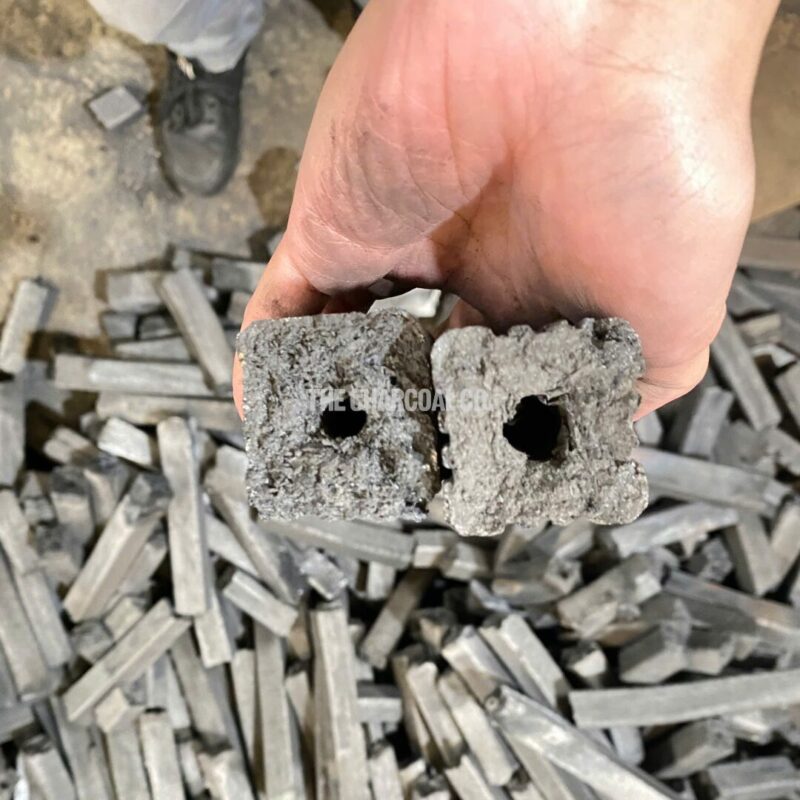
One of the biggest advantages of sawdust charcoal is its high compression density, which directly impacts both burn duration and heat retention. Compared to lump charcoal, which varies in size and density, sawdust charcoal burns up to 40% longer, providing sustained heat for extended cooking periods. This makes it particularly beneficial for high-volume BBQ chains and professional kitchens, where uninterrupted fuel performance is critical.
Another major factor influencing charcoal price is ash production, and sawdust charcoal excels in this regard. With its low ash content, it significantly reduces grill maintenance and cleaning time, improving overall kitchen efficiency. Traditional lump charcoal often produces higher ash residue, which requires frequent disposal and additional labor costs. By using low-ash sawdust charcoal, businesses can reduce downtime and labor expenses, making it a more cost-efficient investment despite its slightly higher price per kilogram.
Heat stability is another essential factor that makes sawdust charcoal a superior option in terms of charcoal price vs. performance. Unlike lump charcoal, which can have inconsistent heat output due to irregular sizes and varying densities, sawdust charcoal maintains steady temperatures throughout its burn cycle. This reduces the need for constant fire adjustments and fuel replenishment, allowing for better control over cooking conditions and improved fuel efficiency. For commercial BBQ operations, this translates to less fuel waste, lower operational costs, and improved cooking consistency—key aspects that justify its pricing.
Although charcoal price for sawdust charcoal may initially appear higher than standard lump charcoal, its longer burn time, lower fuel consumption, and reduced waste generation ultimately lead to greater cost savings in large-scale operations. Importers benefit from its efficient packing and high energy density, which allow for optimized shipping loads and reduced transportation costs. This makes sawdust charcoal a strategic choice for businesses looking to balance upfront costs with long-term profitability, ensuring they get the best value for every dollar spent on charcoal imports.
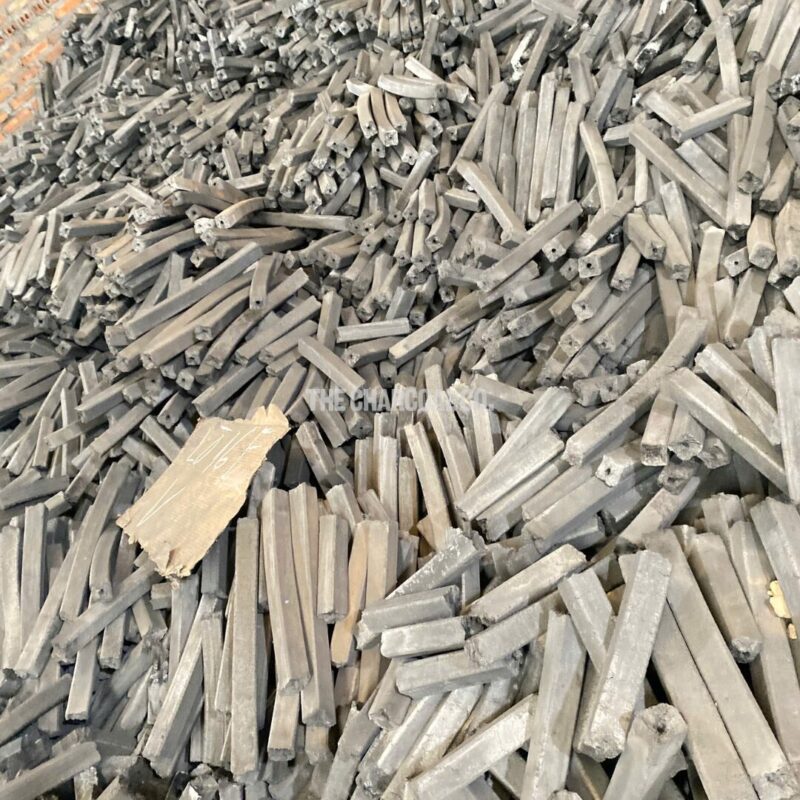
Lump Charcoal – Premium Quality But Not Suitable For Every Operation
When evaluating charcoal price, lump charcoal is often considered a high-end option, frequently used by gourmet chefs and specialty BBQ restaurants. However, while lump charcoal offers certain advantages, it is not always the most practical choice for large-scale BBQ operations, importers, or commercial kitchens.
One of the key characteristics of lump charcoal is its natural wood composition, which gives it a clean burn and the ability to reach higher peak temperatures compared to other charcoal types. This makes it a preferred option for fast-searing steaks and high-heat grilling, where immediate heat output is required. However, this high-intensity combustion also means that lump charcoal burns faster than sawdust charcoal, leading to higher fuel consumption and more frequent refueling.
Another major factor influencing charcoal price is consistency, and lump charcoal struggles in this area. Unlike sawdust charcoal, which is produced with a controlled shape, density, and moisture content, lump charcoal varies in size, density, and structure. This inconsistency creates uneven burning, making it harder to maintain a steady cooking temperature. For commercial kitchens that require long, stable heat for extended cooking periods, this fluctuation can lead to wasted fuel and inefficiencies.
Despite its premium price—typically 10-20% higher than sawdust charcoal, lump charcoal does not always provide the durability and efficiency needed for industrial-scale use. Its irregular shape leads to gaps in heat distribution, forcing chefs to constantly adjust their cooking techniques to compensate for inconsistent burn rates. This makes lump charcoal a less viable option for large-scale grilling operations, where precision and fuel efficiency play a bigger role than just raw heat output.
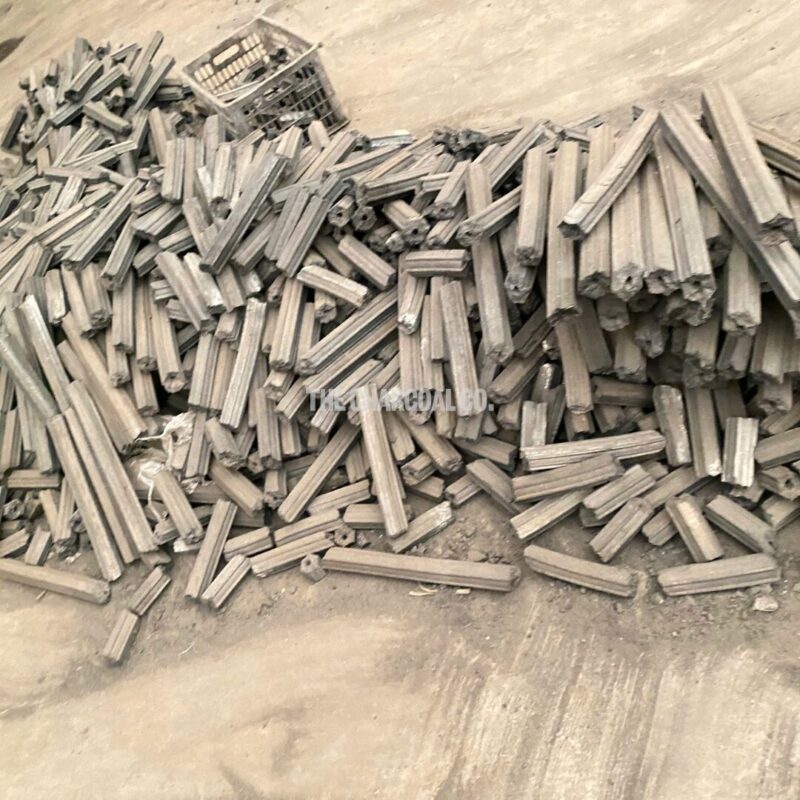
For importers and distributors, the irregularity of lump charcoal also poses logistical challenges. Due to its uneven sizing and lower density, lump charcoal takes up more space in shipping containers, reducing the overall efficiency of bulk transportation. In contrast, sawdust charcoal, with its higher compression and uniform size, allows for better container utilization and lower per-unit freight costs.
While lump charcoal remains a high-quality choice for specific grilling applications, its inconsistent sizing, faster burn rate, and higher cost per kilogram make it less suitable for large-scale BBQ businesses and commercial kitchens that require stable, long-lasting heat output. Businesses focused on fuel efficiency, cost management, and operational consistency will find that sawdust charcoal offers a much better return on investment, despite lump charcoal’s reputation as a premium product.
Briquette Charcoal – Low Cost, But Is It The Best Choice?
Briquette charcoal is often positioned as the most affordable option when comparing charcoal price, making it attractive for businesses looking to minimize upfront costs. However, the real expense of using briquettes goes beyond just the price per kilogram. While cheaper than sawdust charcoal, briquettes come with performance limitations that can drive up total operational costs in large-scale BBQ setups.
One of the biggest concerns with briquette charcoal is its composition. Unlike sawdust charcoal, which is compressed from pure wood material, briquettes are made using binders, fillers, and chemical additives. These substances help maintain a uniform shape and density, but they also impact the burn quality and heat purity. The presence of additives can interfere with the natural grilling process, leading to unwanted flavors that affect food quality, a critical issue for professional BBQ operations where taste consistency is a priority.
Another major drawback of briquette charcoal is its shorter burn time. While its compact shape provides steady combustion, its lower density and high filler content cause it to burn faster than high-quality sawdust charcoal. As a result, businesses end up using more charcoal over time, increasing both fuel consumption and labor costs due to frequent refueling. In contrast, sawdust charcoal burns up to 40% longer, reducing the need for constant replenishment and allowing for more efficient fuel usage in commercial settings.
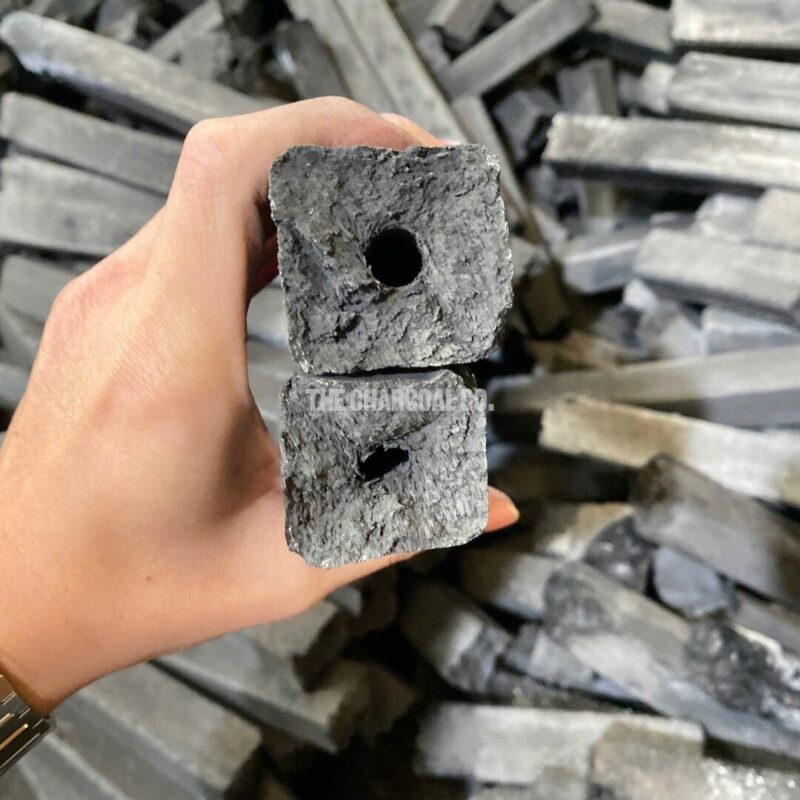
The misconception that briquette charcoal offers the best charcoal price often leads businesses to underestimate long-term expenses. The reality is that frequent refueling, increased labor demands, and lower fuel efficiency can offset any initial savings. For importers and high-volume BBQ operators, choosing a higher-quality, long-burning charcoal—even at a slightly higher charcoal price per kilogram—ultimately results in better cost control, improved grilling consistency, and greater profitability.
Securing a good charcoal price is only part of the equation—ensuring consistent quality is just as important. Learn how to verify quality control when purchasing sawdust charcoal to avoid costly mistakes.
How To Optimize Charcoal Price When Importing In Bulk
For large-scale importers and distributors, securing the best charcoal price is not just about negotiating lower rates—it’s about strategic sourcing, supply chain efficiency, and purchasing models that reduce hidden costs. Many buyers make the mistake of focusing solely on charcoal price per kilogram without factoring in logistics, supplier relationships, and customization options, all of which play a crucial role in total cost savings.
By understanding how to optimize charcoal price at an import level, businesses can secure better margins, more consistent quality, and long-term price stability. One of the most effective ways to achieve this is by sourcing directly from manufacturers rather than relying on intermediaries.
The Advantage Of Sourcing Directly From Manufacturers
One of the most effective ways to reduce charcoal price in bulk orders is to eliminate middlemen and purchase directly from the source. Many importers rely on trading companies or third-party wholesalers, which add an extra layer of markup to the cost. By dealing directly with established manufacturers like The Charcoal Co, businesses can cut down import costs by 10-15%, significantly improving profit margins and price competitiveness.
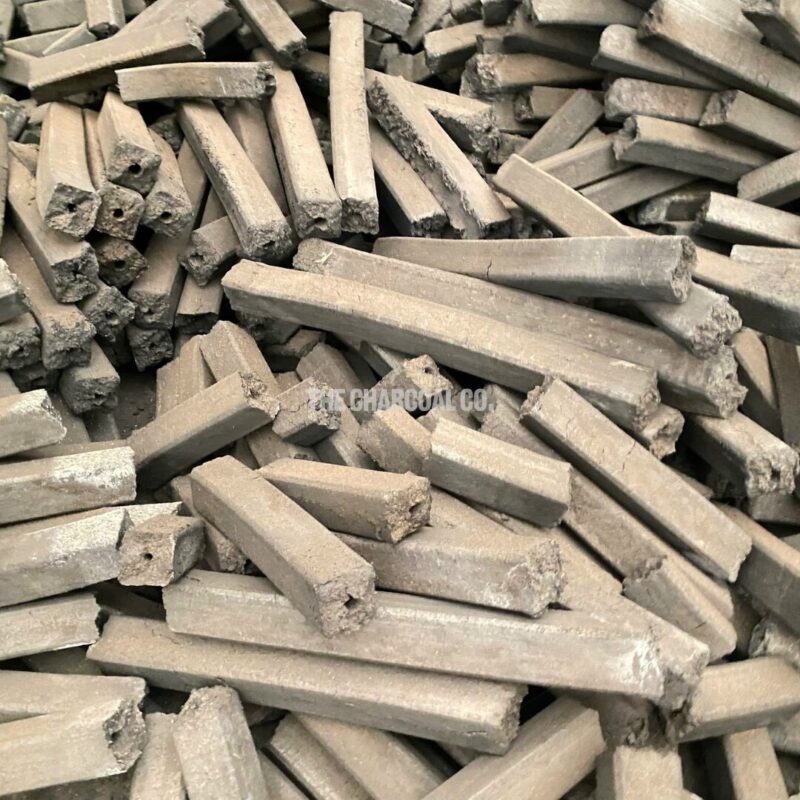
Beyond cost savings, direct sourcing allows buyers to customize charcoal specifications based on market demand and operational needs. Instead of being restricted to off-the-shelf products with fixed specifications, businesses working directly with a manufacturer can fine-tune critical parameters such as moisture content, density, and size uniformity. This level of customization ensures that the charcoal price paid aligns with actual performance, preventing unnecessary waste and inefficiencies.
Another key benefit of manufacturer-direct sourcing is quality control and supply chain transparency. By working with a single, verified supplier, businesses gain greater oversight over production processes, ensuring that each batch maintains consistent burn quality and compliance with international standards. This stability is crucial for importers managing large-scale distribution networks, where variations in charcoal quality can lead to customer complaints, operational inefficiencies, and financial losses.
For importers looking to optimize charcoal price, shifting from a wholesale-based procurement model to direct manufacturer partnerships is one of the most strategic long-term investments. With the ability to reduce intermediary costs, secure tailored product specifications, and maintain price consistency, direct sourcing provides a competitive edge in both cost management and market positioning.
Optimizing Logistics & Transportation Costs
One of the most underestimated factors affecting charcoal price is logistics and transportation efficiency. Many importers focus solely on negotiating lower product costs but fail to optimize shipping methods, packaging efficiency, and container utilization, all of which have a direct impact on total landed cost. A poorly planned shipping strategy can inflate charcoal price by up to 20%, turning what seems like a cost-effective purchase into an overpriced import.

A key issue with bulk charcoal shipments is inefficient container loading, which is especially problematic with lump charcoal due to its irregular shape and inconsistent density. These variations create air pockets and wasted space inside containers, meaning fewer kilograms of charcoal are shipped per load. As a result, the charcoal price per kilogram increases due to higher per-unit shipping expenses. Importers who fail to consider this aspect often pay more for transportation than necessary, reducing their overall cost efficiency.
Sawdust charcoal from The Charcoal Co is engineered specifically to optimize shipping efficiency and lower transportation costs. Unlike lump charcoal, which has a lower packing density, sawdust charcoal is compressed into uniform sizes, allowing for tighter stacking inside containers. This eliminates wasted space and ensures that each container is packed with the maximum possible weight, reducing the cost per kilogram of shipping. With a higher load capacity per shipment, importers can effectively reduce freight costs and improve overall charcoal price economics.
Beyond product density, The Charcoal Co also optimizes packaging solutions to further minimize charcoal price in bulk shipments. High-compression stacking, uniform bag sizing, and reinforced palletization all help prevent breakage, improve weight distribution, and enhance shipping stability. This approach ensures that every kilogram shipped delivers maximum value, reducing unnecessary transportation expenses and protecting profit margins for importers.
Proper logistics planning is essential in securing a lower overall charcoal price. Importers who work with The Charcoal Co benefit from strategic shipment planning, optimized freight routes, and efficient container utilization, ensuring a stable, cost-effective supply chain. By prioritizing high-density, container-efficient sawdust charcoal and well-planned transportation strategies, businesses can cut freight costs, maximize shipping value, and secure a competitive edge in the market.
Not all charcoal is created equal. If you’re looking for Grade A sawdust briquette charcoal that delivers premium quality and performance, this guide will help you make the right choice.

Is Cheap Charcoal Really Worth It?
Many importers prioritize securing the lowest charcoal price, believing that a lower cost per kilogram will translate to higher profit margins. However, this approach often overlooks the hidden costs associated with poor-quality charcoal, which can ultimately make the total expense significantly higher. While a cheaper purchase price may seem attractive at first, factors such as burn efficiency, moisture content, and breakage rate can turn what appears to be a cost-saving decision into an expensive mistake.
One of the biggest drawbacks of low-priced charcoal is its poor burn efficiency. Cheaper charcoal often has lower fixed carbon content and higher moisture levels, leading to faster combustion, inconsistent heat output, and increased fuel consumption. Studies show that low-grade charcoal can burn up to 30% faster than high-quality alternatives, forcing businesses to use more fuel over time to maintain the same cooking performance. This increase in consumption means that the total cost of fuel quickly surpasses the initial savings on charcoal price, making cheap charcoal an economically inefficient choice.
Another major risk of choosing low-cost charcoal is quality inconsistency. Many low-priced suppliers cut costs by using unrefined raw materials, poor carbonization techniques, or improper storage methods, resulting in charcoal with high moisture content, excessive ash production, and high breakage rates. Charcoal that absorbs moisture during transport can lead to difficulty in ignition, reduced heat levels, and increased smoke output, all of which negatively impact grilling efficiency.
For importers, the risks extend beyond just higher fuel consumption—purchasing low-quality charcoal can damage business reputation and market positioning. Buyers who receive fragile, inconsistent, or subpar charcoal are more likely to experience customer complaints, operational inefficiencies, and even contract losses due to unsatisfactory product performance. In contrast, sourcing premium sawdust charcoal from The Charcoal Co ensures stable burn quality, low moisture content, and optimized heat efficiency, providing a reliable and cost-effective solution for importers and distributors.

Securing the best charcoal price is not about finding the cheapest option, but rather investing in the highest long-term value. Businesses that focus solely on low purchase price per kilogram often pay more in the long run due to increased fuel waste, higher labor costs, and damaged credibility. The smartest approach for bulk buyers is to prioritize fuel efficiency, supply chain reliability, and product consistency, ensuring that every shipment delivers maximum performance at the best overall cost.
The Charcoal Co – Competitive Charcoal Price Without Compromising Quality
Securing the right charcoal price is more than just finding the lowest number—it’s about getting the best balance between cost-efficiency and long-term performance. That’s why importers and international BBQ chains trust us at The Charcoal Co. While many suppliers focus solely on offering the cheapest charcoal price, we ensure that affordability never comes at the cost of quality.
Many businesses make the mistake of prioritizing price over efficiency, only to realize that low-cost charcoal often results in higher fuel consumption, excessive ash production, and unreliable heat output. At The Charcoal Co, we solve this problem by producing charcoal with high fixed carbon content, low moisture levels, and optimized density, allowing our customers to achieve greater efficiency per kilogram of fuel used. This means that while our charcoal price per kilogram remains competitive, the total cost of fuel consumption is significantly lower, maximizing value for importers and commercial BBQ operators.
Why Importers And International BBQ Chains Choose Us
One of the key reasons why importers and large-scale BBQ businesses trust us is our ability to provide stable, high-performance charcoal without price fluctuations. Many suppliers in the market experience seasonal price spikes and inconsistent product quality, making it difficult for businesses to plan bulk purchases with confidence. We, however, guarantee a steady supply chain with fixed pricing agreements, ensuring that our customers always receive consistent charcoal price terms without unexpected cost increases.
Beyond pricing stability, our commitment to quality control means that every batch meets strict international standards. Unlike lower-grade alternatives that often contain excessive moisture or impurities, our charcoal undergoes a controlled carbonization process, resulting in a product that burns cleanly, produces minimal ash, and delivers stable heat output. With a moisture content below 8% and a fixed carbon percentage above 75%, our charcoal ensures exceptional fuel efficiency, allowing businesses to reduce refueling frequency and optimize operational costs.
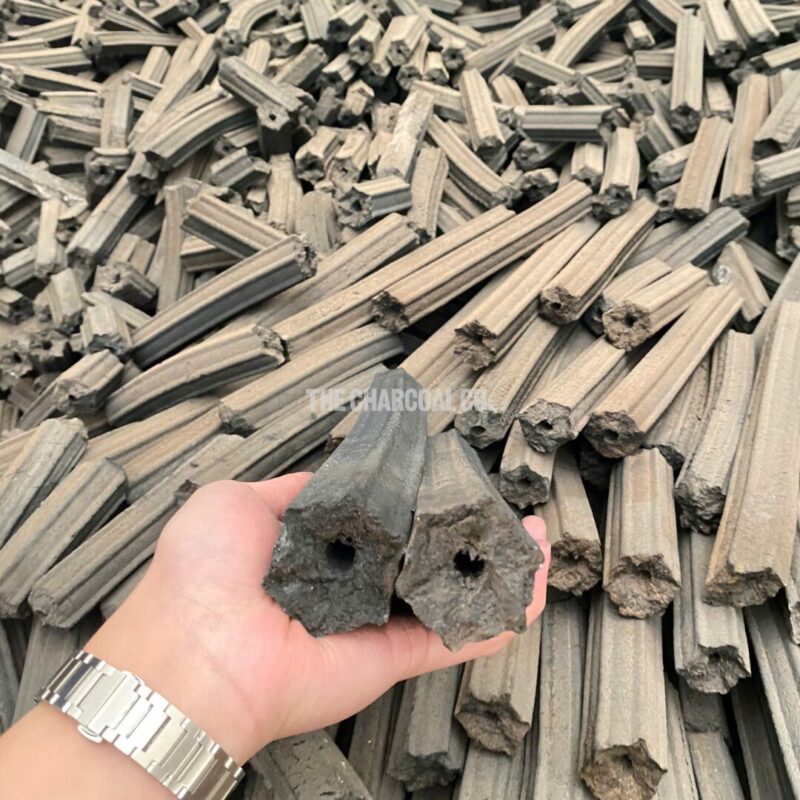
For businesses looking to secure the best charcoal price without sacrificing quality, we offer a unique advantage. By providing bulk pricing solutions, supply chain reliability, and high-efficiency fuel performance, we help importers and BBQ chains achieve long-term cost savings while maintaining product excellence. In an industry where fuel efficiency and reliability directly impact profitability, choosing the right supplier makes all the difference—and that’s why The Charcoal Co remains the trusted name in premium charcoal supply.
Conclusion
Securing the best charcoal price isn’t just about finding the lowest number—it’s about ensuring efficiency, consistency, and long-term savings. Choosing high-quality charcoal means lower fuel consumption, fewer refueling interruptions, and better grilling performance, making it the smarter investment for bulk buyers.
At The Charcoal Co, we deliver competitive charcoal price without compromising on quality, helping importers and BBQ businesses optimize costs while maintaining premium fuel performance. The right charcoal isn’t just about price—it’s about value. Are you ready to invest in efficiency?
The Charcoal Co.® - Leading manufacturer of high quality sawdust charcoal from Vietnam.
-
We are the Leading manufacturer of high quality sawdust charcoal (Ogatan charcoal) from Vietnam. Wholesale export to the Middle East, Korea, Japan, USA. We are FSC certified.